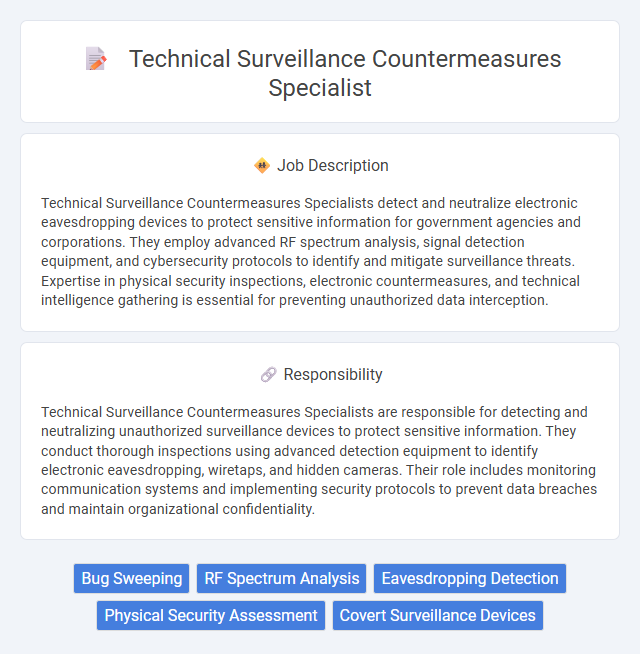
Technical Surveillance Countermeasures Specialists detect and neutralize electronic eavesdropping devices to protect sensitive information for government agencies and corporations. They employ advanced RF spectrum analysis, signal detection equipment, and cybersecurity protocols to identify and mitigate surveillance threats. Expertise in physical security inspections, electronic countermeasures, and technical intelligence gathering is essential for preventing unauthorized data interception.
Individuals with a strong attention to detail and high levels of discretion are likely to be suitable for a Technical Surveillance Countermeasures Specialist role, given the job's requirement to detect and neutralize covert surveillance devices. People who remain calm under pressure and have a keen analytical mindset may better handle the technical and investigative aspects involved. It is probable that those uncomfortable with prolonged periods of vigilance or sensitive environments might find this career challenging.
Qualification
A Technical Surveillance Countermeasures (TSCM) Specialist requires expertise in electronic surveillance detection, signal analysis, and cybersecurity protocols. Proficiency in identifying and neutralizing hidden listening devices, GPS trackers, and covert cameras is essential, alongside knowledge of radio frequency (RF) spectrum monitoring and countermeasure technologies. Certifications such as CISSP, CEH, or specialized TSCM training programs enhance credibility and demonstrate advanced technical skills in threat detection and mitigation.
Responsibility
Technical Surveillance Countermeasures Specialists are responsible for detecting and neutralizing unauthorized surveillance devices to protect sensitive information. They conduct thorough inspections using advanced detection equipment to identify electronic eavesdropping, wiretaps, and hidden cameras. Their role includes monitoring communication systems and implementing security protocols to prevent data breaches and maintain organizational confidentiality.
Benefit
A Technical Surveillance Countermeasures Specialist likely enhances organizational security by identifying and neutralizing surveillance threats, reducing the risk of confidential information leaks. This role may provide increased confidence in maintaining privacy, protecting intellectual property, and ensuring operational integrity. Employers might benefit from minimized vulnerabilities, promoting stronger overall cybersecurity and risk management.
Challenge
Technical Surveillance Countermeasures Specialists likely face the challenge of detecting increasingly sophisticated covert devices designed to breach security. The evolving nature of surveillance technology probably requires continuous learning and adaptation to identify hidden sensors or bugs effectively. Balancing thoroughness with discretion in sensitive environments might also pose significant operational difficulties.
Career Advancement
A Technical Surveillance Countermeasures Specialist advances their career by gaining expertise in detecting and neutralizing sophisticated electronic surveillance devices used in corporate and government environments. Progression often involves acquiring certifications in cybersecurity, intelligence analysis, and signal detection technologies, coupled with experience in counterintelligence operations. Career growth can lead to senior roles in security consulting firms, government agencies, or private sector organizations specializing in high-level protective services.
Key Terms
Bug Sweeping
Technical Surveillance Countermeasures Specialists specialize in detecting and neutralizing unauthorized surveillance devices through advanced bug sweeping techniques. They use cutting-edge equipment such as radio frequency detectors, spectrum analyzers, and nonlinear junction detectors to locate hidden microphones, cameras, and transmitters. Expertise in bug sweeping ensures confidentiality and security for corporate, government, and private clients against espionage and information theft.
RF Spectrum Analysis
A Technical Surveillance Countermeasures Specialist conducts thorough RF spectrum analysis to detect and neutralize unauthorized surveillance devices, protecting sensitive environments from electronic espionage. Utilizing advanced spectrum analyzers and signal intelligence tools, specialists identify suspicious frequencies and transmissions that indicate covert listening or tracking devices. Expertise in RF propagation patterns and signal modulation enables the precise location and mitigation of threats within complex electromagnetic environments.
Eavesdropping Detection
A Technical Surveillance Countermeasures Specialist excels in eavesdropping detection by employing advanced signal analysis and electronic sweep techniques to identify hidden listening devices. Utilizing spectrum analyzers, non-linear junction detectors, and RF scanning equipment, they locate covert transmitters, microphones, and recording devices in sensitive environments. Their expertise ensures the protection of confidential communications by mitigating risks associated with unauthorized surveillance and espionage.
Physical Security Assessment
Technical Surveillance Countermeasures Specialists conduct thorough Physical Security Assessments to identify and mitigate risks from electronic eavesdropping devices and other covert surveillance threats. They employ advanced detection technologies and methods to evaluate vulnerabilities in facilities, ensuring the protection of sensitive information and assets. Their expertise in securing physical environments is critical for preventing unauthorized access and maintaining operational integrity.
Covert Surveillance Devices
Technical Surveillance Countermeasures Specialists detect, analyze, and neutralize covert surveillance devices such as hidden cameras, audio bugs, and GPS trackers used for unauthorized monitoring. They employ advanced electronic detection equipment and signal analysis techniques to identify sophisticated espionage tools in corporate, government, and personal environments. Expertise in RF spectrum analysis, thermal imaging, and physical inspection ensures secure environments free from invasive surveillance threats.
 kuljobs.com
kuljobs.com